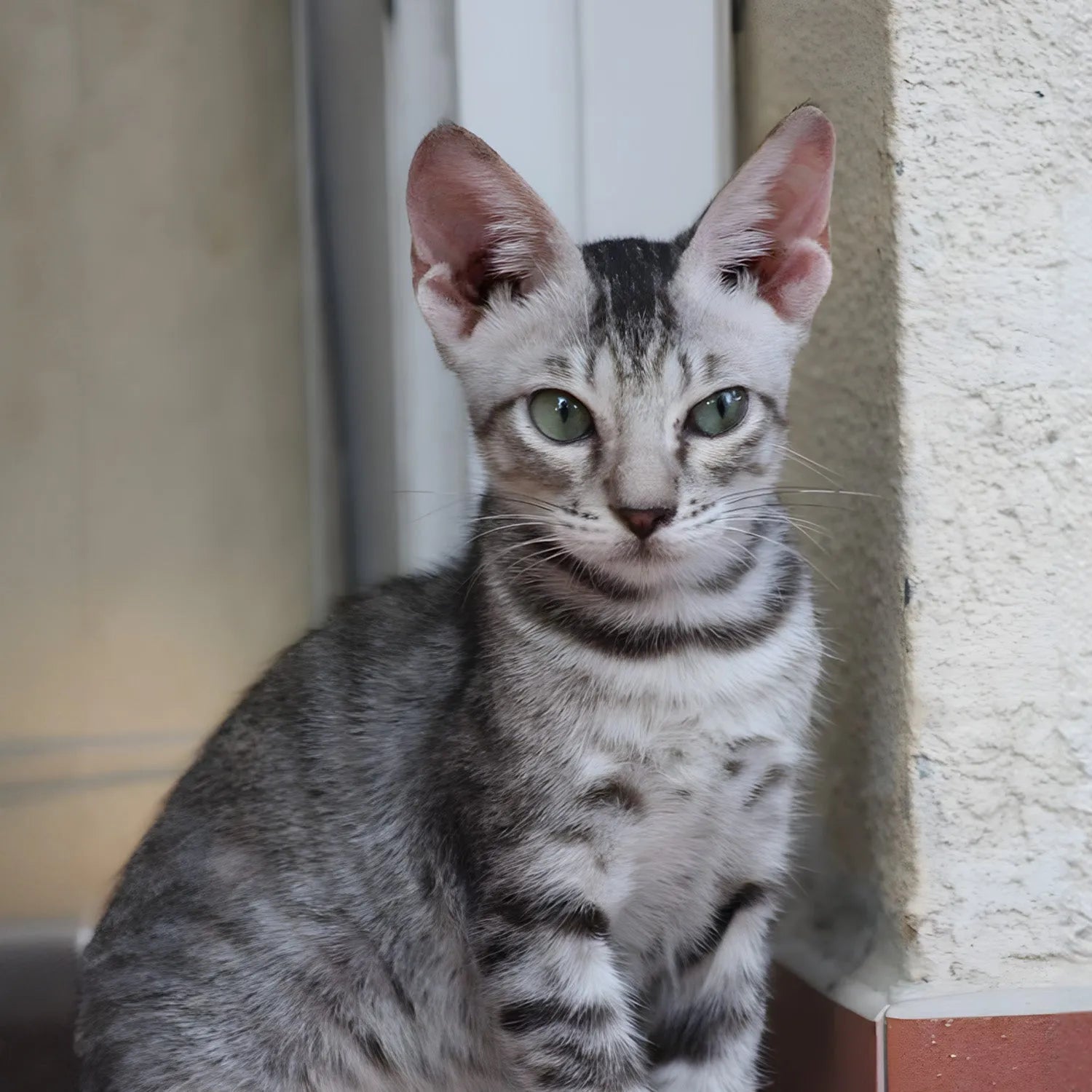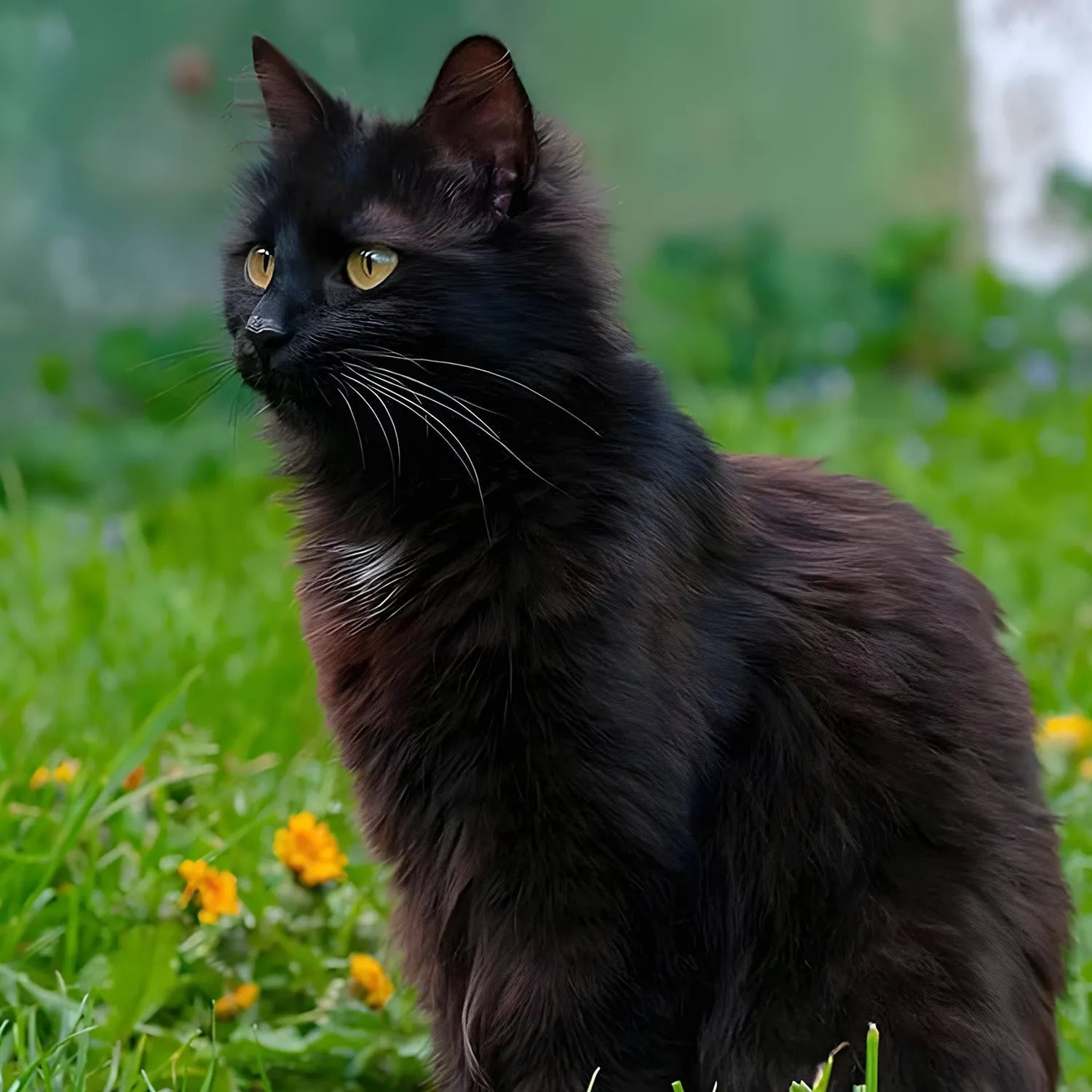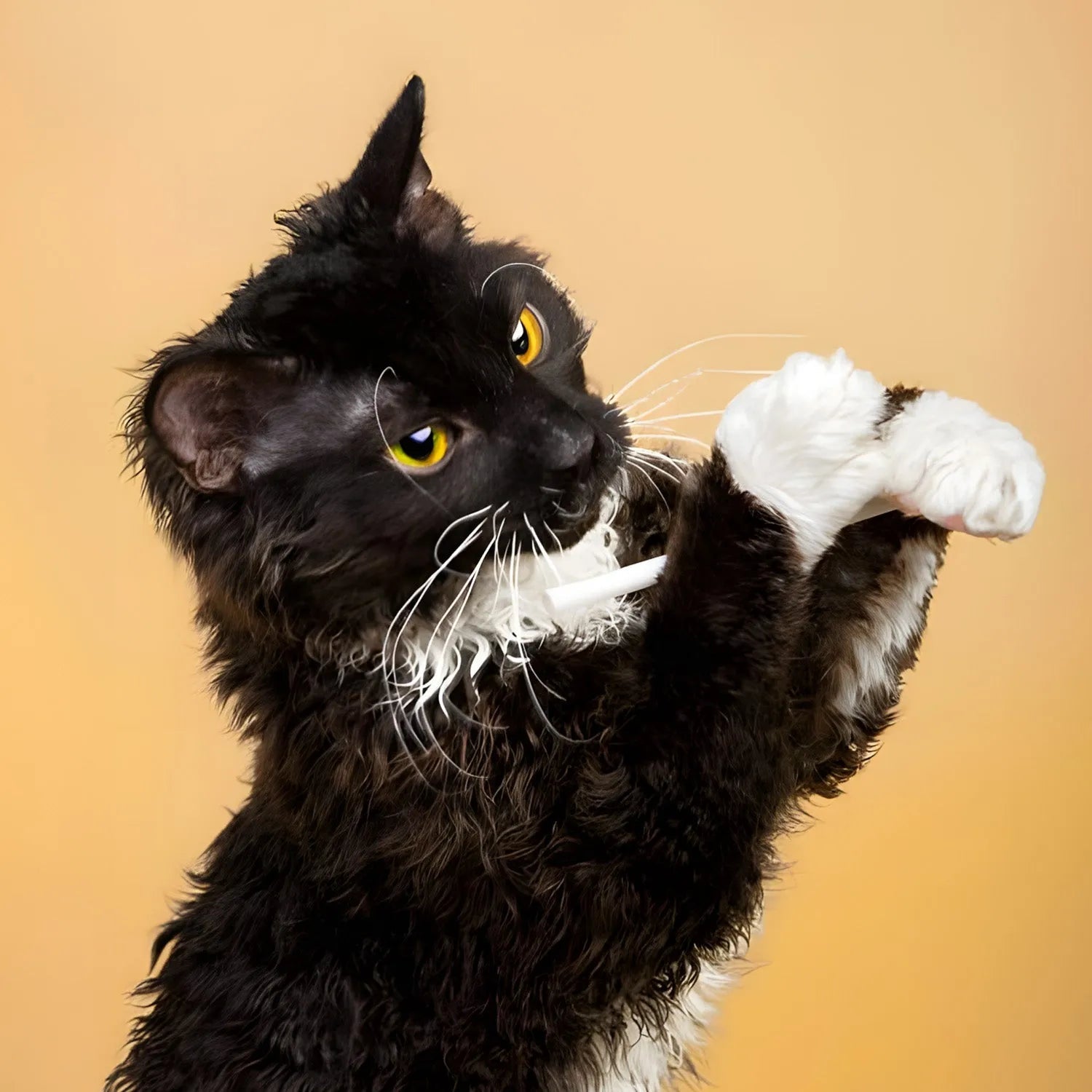Sokoke: The Wild and Rare Kenyan Forest Cat
Introduction
The Sokoke cat is one of the rarest domestic breeds, originating from the forests of Kenya. Known for its striking wild appearance and high energy levels, the Sokoke is a breed that stands out for its intelligence, agility, and affectionate nature. Despite their exotic look, these cats form strong bonds with their human families and make excellent companions for those who appreciate an active and interactive pet. In this blog, we’ll dive deep into the Sokoke cat’s lifestyle, behavior, grooming needs, and how it interacts with humans and other pets.
Ratings (1-5)
-
Environmental Adaptability: 4
-
Food Consumption: 3
-
Need for Companionship: 4
-
Trainability: 5
-
Tolerance of Children: 4
-
Ease of Domestication: 4
History and Origins
The Sokoke cat originated in the Arabuko Sokoke forest in Kenya, Africa, and is believed to be a naturally occurring breed. It was first discovered by Kenyan native Jeni Slater in the late 1970s, who found kittens in the wild and began breeding them for their unique appearance and temperament. These cats were later exported to Europe, where breeders further developed the breed.
Despite their wild origins, the Sokoke is a fully domestic breed and has adapted well to life in homes. However, they remain incredibly rare and are considered a prized breed by cat enthusiasts. The Sokoke was officially recognized by The International Cat Association (TICA) in the 1990s.
Physical Characteristics and Colors
The Sokoke cat has a distinctive wild look, thanks to its sleek, muscular body, long legs, and short, close-lying coat. They have a medium build, but their agile and athletic frame gives them the appearance of being larger than they are. Their heads are wedge-shaped with large, expressive almond-shaped eyes that are typically green or amber. Their ears are medium-sized and sit high on the head, adding to their alert, inquisitive look.
One of the most striking features of the Sokoke is its unique coat pattern, which is typically a marbled or blotched tabby pattern. The coat is short, close to the body, and lies flat, giving them a streamlined, athletic appearance. The marbling on their coat often resembles the dappled patterns of light filtering through the trees in their native forest habitat, adding to their wild charm.
Common coat colors include:
-
Brown Marbled Tabby: The most common color, featuring a brown base coat with darker, intricate marbling patterns.
-
Mackerel Tabby: A variant with striped markings that run vertically along the body.
Their wild-looking coats and lean, agile bodies give the Sokoke an exotic appearance that sets them apart from other domestic breeds.
Lifestyle and Behavior
Sokoke cats are highly energetic and playful. They have retained many of the behaviors of their wild ancestors, including a love of climbing, jumping, and exploring. These cats need plenty of space and mental stimulation to stay happy, so they are well-suited to homes with access to climbing trees, cat towers, and interactive toys.
Despite their wild origins, Sokoke cats are affectionate and loyal to their human family members. They form strong bonds with their owners and are known for their devotion. Sokokes are social cats that enjoy being part of daily activities and will often follow their owners from room to room, curious about what’s going on. While they are not as vocal as some other breeds, they will communicate with soft chirps and trills when they want attention.
These cats are very active and need regular playtime to burn off their energy. They love interactive games, and their intelligence means they thrive on puzzles and toys that challenge their minds. Sokoke cats are agile climbers and will appreciate high perches and shelves where they can survey their surroundings.
Trainability and Intelligence
Sokoke cats are highly intelligent and can be trained to follow commands, perform tricks, and even walk on a leash. Their inquisitive nature means they enjoy mental challenges, and they are quick to learn new skills. Sokokes respond well to positive reinforcement techniques, such as treats and praise, and enjoy interactive games that stimulate their minds.
These cats are natural problem solvers, and they can figure out how to open doors or get into cupboards if they are motivated to do so. Because of their intelligence, they need plenty of mental stimulation to keep them engaged and prevent boredom. Puzzle toys, interactive feeders, and training sessions are great ways to keep their minds sharp.
Sokoke cats are also known for their agility and love of climbing, so providing them with plenty of vertical space is important for their well-being. They will appreciate climbing trees, shelves, or even walking on leashes outdoors if introduced to it early.
Social Behavior and Human Interaction
Sokoke cats are social animals that enjoy the company of their human family members. While they are not overly demanding of attention, they appreciate being near their owners and will often follow them around the house to see what they are up to. Sokokes are affectionate without being clingy, and they enjoy cuddling when they are in the mood.
These cats are known for their strong bonds with their owners, and they can be quite loyal and protective of their family. Despite their active and independent nature, Sokokes will seek out affection and enjoy spending time with their humans, whether it’s playing or relaxing together.
Sokoke cats are also known for being curious about their surroundings. They enjoy exploring every nook and cranny of the house, and they are often found perched on high shelves or windowsills, watching the world outside. Their independent nature means they can entertain themselves when needed, but they will always come back to check in with their humans.
Compatibility with Children and Other Pets
Sokoke cats are generally good with children, especially older kids who understand how to interact with cats respectfully. Their playful and active nature makes them fun companions for children who enjoy interactive play. However, due to their high energy levels, they may not be the best match for very young children unless closely supervised.
In addition to being good with children, Sokoke cats tend to get along well with other pets, including dogs. Their confident and curious nature allows them to integrate into multi-pet households, and they often enjoy the company of other animals, provided they are introduced gradually. Sokokes have a high prey drive, so care should be taken around smaller pets such as birds, hamsters, or reptiles.
Grooming and Care
The grooming needs of a Sokoke cat are minimal due to their short, sleek coat. Weekly brushing is usually sufficient to remove loose hairs and keep their coat looking healthy and shiny. Their fur does not mat easily, and they are relatively low-maintenance when it comes to grooming.
In addition to regular brushing, Sokoke cats require routine dental care, ear cleaning, and nail trimming to maintain their overall health. Their grooming needs are generally low, making them ideal for owners who want a cat that is easy to care for.
Health and Lifespan
Sokoke cats are generally healthy, with no major breed-specific health concerns. Because they are a natural breed, they benefit from a diverse gene pool, which helps reduce the risk of genetic health issues. However, like all cats, they can be prone to common feline conditions such as dental issues or obesity if not properly cared for.
Regular veterinary check-ups, a balanced diet, and maintaining a healthy weight are essential to keeping your Sokoke in good health. With proper care, Sokoke cats typically live 12-15 years or more, making them long-term companions for any household.
Environmental Adaptability
Sokoke cats are adaptable and can thrive in various living environments, but they do best in homes where they have plenty of space to explore and play. They are particularly well-suited to indoor living, where they can enjoy a calm and predictable routine. However, because of their active and curious nature, they need plenty of mental and physical stimulation to stay happy.
Sokoke cats love climbing and will appreciate having access to high perches, cat trees, and climbing shelves. They enjoy being able to explore their surroundings from above, so vertical space is just as important as floor space for this breed. They can also be leash-trained and enjoy exploring the outdoors in a controlled environment.
Feeding Requirements
A balanced diet is crucial for maintaining the health and energy levels of Sokoke cats. High-quality cat food that is rich in protein is recommended to support their muscular build and overall well-being. Fresh water should always be available. Because Sokoke cats are active and energetic, it’s important to monitor their food intake to ensure they are receiving the proper nutrition to support their activity levels.
Consult your veterinarian for specific dietary recommendations based on your cat's age, weight, and health needs. Regular play sessions and activities that encourage physical movement can also help keep your Sokoke healthy and fit.
Conclusion
The Sokoke is a rare and exotic breed that combines beauty, intelligence, and affection. Their strong bonds with their human companions, combined with their active and playful nature, make them wonderful pets for individuals or families who can provide plenty of mental and physical stimulation. If you're looking for an agile, intelligent, and loyal companion, the Sokoke may be the perfect fit.
For more information about other cat breeds and pet care tips, stay tuned to our blog!
References:
-
Davis, M. (2021). "The Rare and Intelligent Sokoke Cat." *Journal of Feline Studies*, 35(3), 215-230.
-
Thompson, A. (2020). "Caring for Your Sokoke: A Comprehensive Guide." *Cat Lover’s Magazine*, July issue, pp. 25-33.
-
Harris, E. (2019). "Health and Wellness in Sokoke Cats." *Veterinary Journal*, 79(2), 123-137.


